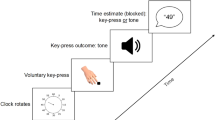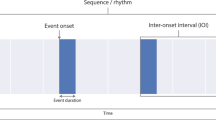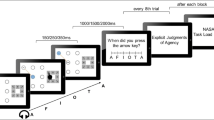Abstract
We examined the influence of a ticking clock on task performance using a laboratory experiment. We investigated how performance changed in response to various clock ticking speeds using a trick clock that allowed us to control its ticking speed. We found that the subjects’ performance was influenced by the speed at which the clock ticked: Particularly, individuals showed slower performance when exposed to a slow-ticking clock. We demonstrated that common environmental stimuli encountered in daily life, such as the ticking of a clock, have a significant effect on human behavior.




Similar content being viewed by others
Notes
At this time, the exchange rate was about $1 = ¥91.
The fixed effects panel model can control unobserved heterogeneity among individuals using dummy variables. Refer to econometrics textbooks, such as that by Baltagi (2013), for more information.
References
Baltagi BH (2013) Economic analysis of panel data, 5th edn. Wiley, New York
Davidson CW, Powell LA (1986) The effects of easy-listening background music on the on-task-performance of fifth-grade children. J Educ Res 80:29–33
Gibbon J (1977) Scalar expectancy theory and Weber’s law in animal timing. Psychol Rev 84:279–325
Koyano E (1985) A study of periodic lengths for input human error curve and pulse speed variability curve. A study of the characteristics of the office work based on the physiological index. Part IV. J Jpn Ind Manag Assoc 36(4):287–291 (in Japanese)
Lesiuk T (2005) The effect of music listening on work performance. Psychol Music 33(2):173–191
Liu B, Huanga Y, Wanga Z, Wu G (2012) The influence of background music on recognition processes of Chinese characters: an ERP study. Neurosci Lett 518:80–85
Matumura N (2012) Shikakeology. http://shikakeology.org/
McElrea H, Standing L (1992) Fast music causes fast drinking. Percept Mot Skills 75:362
Moller LE (1980) Performance of musicians under noise. Percept Mot Skills 50:301–302
Nittono H, Tsuda A, Akai S, Nakajima Y (2000) Tempo of background sound and performance speed. Percept Mot Skills 90:1122
Acknowledgments
We thank Yoshihiro Miyai, Tomoya Nishi, and Koushirou Kane for the development of the materials of our experiment. We are also indebted to Shunichiro Oka and Yuki Nakauchi for their assistance with our experiment.
Author information
Authors and Affiliations
Corresponding author
Rights and permissions
About this article
Cite this article
Yamane, S., Matsumura, N. The effect of a ticking clock on task performance. AI & Soc 30, 443–449 (2015). https://doi.org/10.1007/s00146-014-0563-6
Received:
Accepted:
Published:
Issue Date:
DOI: https://doi.org/10.1007/s00146-014-0563-6




